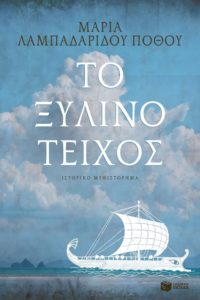In 480 BC, Persian king Xerxes invaded Greece with an army whose size was unparalleled in history. Once the 300 heroic Spartans had been defeated at Thermopylae, the road to Athens was wide open, spreading terror and panic across Attica.
According to Herodotus’s narrative, the Athenians turned to the Oracle of Delphi, whose prophecy read: “Though all else shall be taken, Zeus, the all-seeing, grants that the wooden wall only shall not fail.”
Various opinions were offered as to what this ‘wooden wall’ actually meant. Some favoured the option of literally building a wooden wall around the Acropolis. General Themistocles, however, came up with a different interpretation: the wooden wall was a reference to the ships which the Athenians had been swiftly building in the years preceding the Persian advance. Driven by Themistocles’s profound strategic and political genius, the Greek allied fleet triumphed in Salamis after Athens had been burnt, while those who trusted the more conventional verbatim reading of the prophecy suffered the fatal outcome of their decision.
Maria Lampadaridou Pothou’s historical novel The Wooden Wall (Το Ξύλινο Τείχος) offers a fascinating insight into the values, beliefs and fears of the Ancient Greeks. It highlights the importance of enlightened leadership, especially when confronted with hubris, the arrogance that fuelled the Persians’ dreams of dominance. The story is narrated through the eyes of Alcamenes, first a slave and later a free citizen with links to the island of Lemnos, Athens and Sparta, who participates in all three main battles of the Greeks against the Persians in 480-479 BC, standing close to their protagonists.
Throughout history, humankind has been faced with dilemmas as to how to address most effectively major challenges that call into question long-standing norms and well-established routines. The current pandemic, with its massive global socio-economic impact, is definitely one such case, making the oracle of the ‘wooden wall’ all the more relevant. We can draw inspiration from Themistocles, a shining historical example of how visionary thinking, resilience, innovation, openness and inclusion can help overcome the most unfavourable odds. More importantly, Themistocles’s success was predicated on the values of democracy and social participation, which were born in Ancient Greece and constitute the foundation of our European Union; it is these values which ensure the buy-in and ownership necessary for societies to come together in times of crisis. ‘The Wooden Wall’ offers inspiration in these trying times and reminds us of the timeless value of democratic principles.
Ancient Greek literary works need no introduction. But modern Greek literature has also produced several masterpieces, not least the works of two Nobel Prize laureates – Giorgos Seferis and Odysseas Elytis. Discover more Greek literature in Eureka, the online catalogue of the Council libraries.

